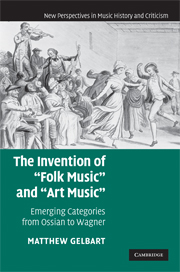Crossref Citations
This Book has been
cited by the following publications. This list is generated based on data provided by Crossref.
Sarkisova, Oksana
2010.
Folk songs in Soviet orchestration: Vostokfil'm'sSong of Happinessand the forging of the New Soviet Musician.
Studies in Russian and Soviet Cinema,
Vol. 4,
Issue. 3,
p.
261.
Gelbart, Matthew
2012.
ALLAN RAMSAY, THE IDEA OF ‘SCOTTISH MUSIC’ AND THE BEGINNINGS OF ‘NATIONAL MUSIC’ IN EUROPE.
Eighteenth Century Music,
Vol. 9,
Issue. 1,
p.
81.
van der Linden, Bob
2013.
Music and Empire in Britain and India.
p.
129.
2013.
The Orchestral Revolution.
p.
53.
Gelbart, Matthew
2013.
Representation in Western Music.
p.
13.
Castelo-Branco, Salwa El-Shawan
2013.
The Cambridge History of World Music.
p.
661.
Irving, David R.M.
2014.
Hybridity and harmony.
Indonesia and the Malay World,
Vol. 42,
Issue. 123,
p.
197.
McKerrell, Simon
2014.
Traditional arts and the state: The Scottish case.
Cultural Trends,
Vol. 23,
Issue. 3,
p.
159.
Leerssen, Joep
2014.
Romanticism, music, nationalism.
Nations and Nationalism,
Vol. 20,
Issue. 4,
p.
606.
Andronikou, Michalis
and
Sallis, Friedemann
2014.
Centring The Periphery: Local Identity in the Music of Theodore Antoniou and other Twentieth-Century Greek Composers.
Intersections,
Vol. 33,
Issue. 1,
p.
11.
van der Linden, Bob
2015.
Non-Western national music and empire in global history: interactions, uniformities, and comparisons.
Journal of Global History,
Vol. 10,
Issue. 3,
p.
431.
Cortez, Alcina
2016.
How Popular Music is Exhibited by Museums in Portugal at the Beginning of the Twenty‐First Century: A Case Study.
Curator: The Museum Journal,
Vol. 59,
Issue. 2,
p.
153.
Laxer, Daniel
2016.
“Row, Brothers, Row”: Canadian Boat Songs, Imperial Glee, and National Identity, 1805-67.
Journal of Canadian Studies,
Vol. 50,
Issue. 1,
p.
70.
GOODMAN, GLENDA
2017.
Transatlantic Contrafacta, Musical Formats, and the Creation of Political Culture in Revolutionary America.
Journal of the Society for American Music,
Vol. 11,
Issue. 4,
p.
392.
Blackstone, Lee Robert
2017.
The Aural and Moral Idylls of “Englishness” and Folk Music.
Symbolic Interaction,
Vol. 40,
Issue. 4,
p.
561.
Lima, Lurian José Reis da Silva
2017.
Villa-Lobos e a música popular – Uma suíte "à brasileira".
Revista Vórtex,
Vol. 5,
Issue. 1,
p.
1.
Capitain, Wouter
2017.
Edward Said on Popular Music.
Popular Music and Society,
Vol. 40,
Issue. 1,
p.
49.
Lowthorp, Leah K.
2017.
Folklore, politics, and the state: Kutiyattam theatre and national/global heritage in India.
South Asian History and Culture,
Vol. 8,
Issue. 4,
p.
542.
Pereira, Edmundo
2018.
Política, desentendimento e representação fonográfica entre os Tikuna.
Mundo Amazónico,
Vol. 9,
Issue. 1,
McAleer, Paul Robert
2018.
The Multiple Functions ofCriollo,Gauchoand Indigenous Symbols inLa Historieta Patoruzú, 1936–50: The Conflicts of Peronism, Nationalism and Migration.
Journal of Latin American Cultural Studies,
Vol. 27,
Issue. 2,
p.
253.





